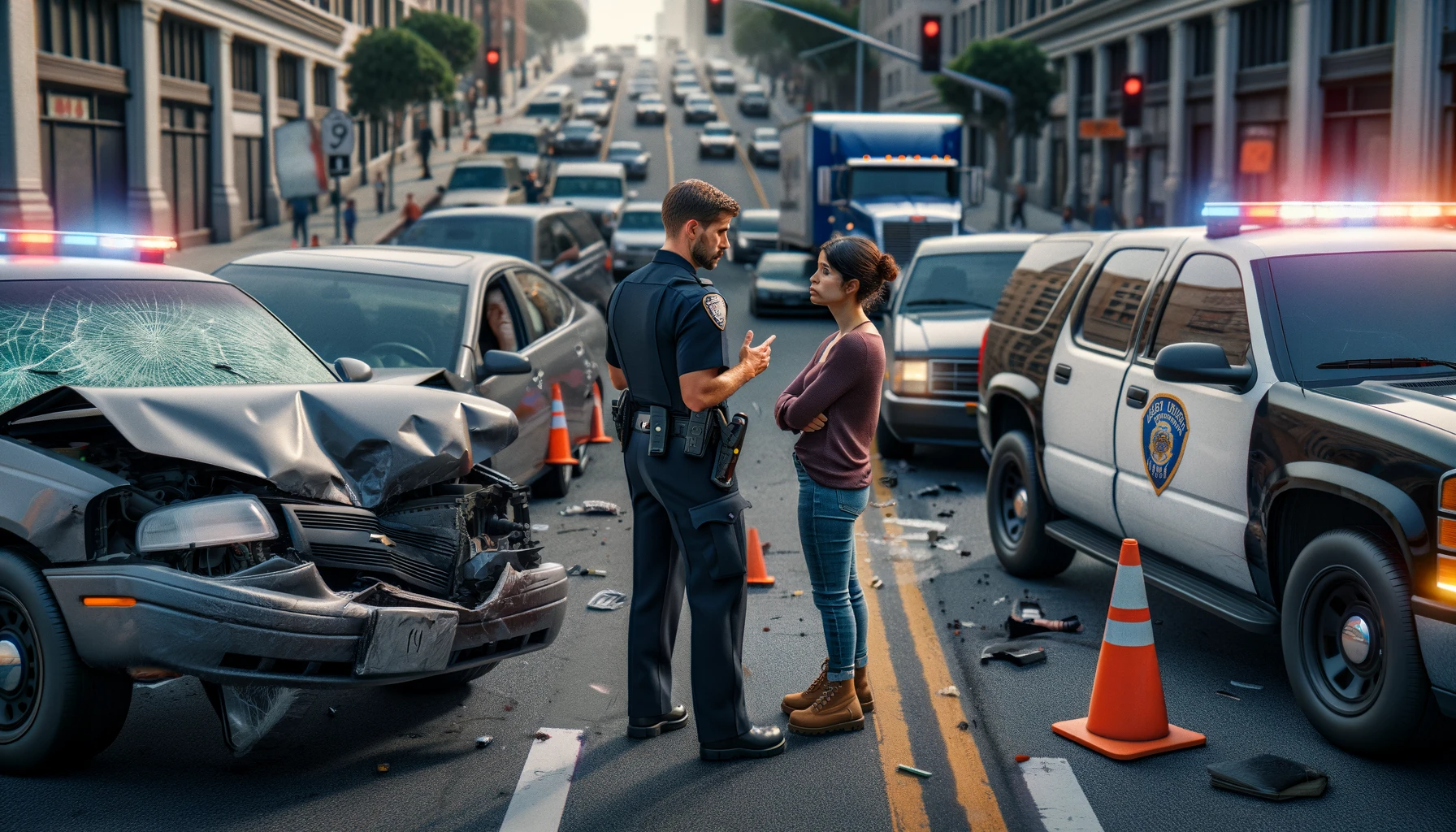Introduction
Picture this: you’re in an
accident, shaken but safe. You exchange information with the other driver, only to discover they’re uninsured. Suddenly, what should have been a straightforward process becomes tangled with complications and uncertainty. This scenario is more common than you might think, and when it does happen, understanding your legal rights and available resources can make all the difference. Without the cushion of insurance to back up the other driver, you might feel overwhelmed, wondering how to cover the unexpected expenses. Whether it’s damage to your vehicle, medical costs, or time off work, these expenses can add up fast. This guide aims to give you a clear pathway forward, showing you how to navigate the often-challenging waters of dealing with an uninsured driver and how to find the resources you need to protect yourself financially and legally.
Why Uninsured Driver Cases Are Challenging
Accidents involving uninsured drivers present unique challenges, as they frequently leave victims financially exposed. With no insurance to cover damages, the responsibility for the
accident’s financial aftermath often shifts to the innocent party. Without a solid plan, you may face substantial out-of-pocket costs, covering everything from vehicle repairs to medical bills and even legal fees if you decide to seek compensation. Understanding your options, however, and knowing the legal steps to take, can be the first line of defense in protecting yourself. By taking proactive measures and seeking the right advice early, you can minimize the impact of these financial risks and secure a way to handle future costs.

Immediate Steps After an Accident
Staying Calm and Assessing Injuries
Your immediate reaction to an
accident is crucial. Start by ensuring everyone’s safety. Check for injuries, and if anyone appears injured, call emergency services immediately. Staying calm will help you make better decisions, remain focused, and think clearly about the necessary steps. Calmness will also allow you to assess the situation accurately and interact respectfully with the other driver, regardless of the circumstances. Knowing that you can take steps to protect yourself legally and financially can help ease initial fears and enable you to approach the situation with a clear mind.
Documenting the Accident Scene
Once safety is established, thoroughly document the accident scene. Take clear photos of the entire scene, focusing on the vehicle damages, any skid marks, road conditions, and visible injuries to passengers. This evidence will be essential later, especially in uninsured motorist cases, as it can support your claim or legal case. Don’t forget to note any other details, like weather conditions or potential witnesses. Keep a record of everything as accurately as possible because, without the other driver’s insurance, every piece of evidence can make a significant difference.
Notifying Authorities and Your Insurance Company
Filing a Police Report
Even in what might seem like a minor
accident, it’s essential to contact the police and file a report. The police report becomes an official record of the incident, which can be invaluable if you need to file a claim or pursue legal action. Having this report helps you avoid any he-said-she-said scenarios that might arise and provides a trusted account of the accident. A police report is particularly useful when dealing with an uninsured driver, as it documents the circumstances and provides an unbiased account of the event.
Contacting Your Insurance Provider Immediately
Reach out to your insurance company as soon as possible to report the accident. Explain the details clearly and inform them that the other driver is uninsured. If you have uninsured motorist (UM) coverage, this is when it becomes a critical asset. Your insurer will guide you on how to file the claim under UM coverage, which can cover some or all of the costs associated with the
accident. By contacting your insurer promptly, you also avoid any potential delays that could affect your eligibility for coverage.
The Role of Uninsured Motorist (UM) Coverage
Definition of UM Coverage
Uninsured motorist (UM) coverage is part of an auto insurance policy that offers financial protection if you’re involved in an accident with a driver who doesn’t have insurance. UM coverage is designed to fill the gap when the at-fault driver cannot pay for damages, covering costs like vehicle repairs, medical expenses, and sometimes even lost wages. Understanding UM coverage is crucial, as it essentially steps in as a substitute for the other driver’s nonexistent insurance, providing much-needed financial relief.
Benefits and Limitations of UM Insurance
While UM insurance can be incredibly helpful, it’s essential to know its limitations. UM coverage varies from one policy to another, and each policy comes with its own set of conditions and payout caps. Review your policy thoroughly to know exactly what is covered and any potential exclusions. Some policies may cap the total amount they’ll pay out, which could be problematic if damages are extensive. Knowing these limitations helps you set realistic expectations and plan accordingly if you need additional resources.
Understanding Medical Payments (MedPay) Coverage
What MedPay Covers
Medical Payments (MedPay) is an optional coverage that can assist with medical expenses resulting from an
accident, regardless of fault. MedPay is often seen as a complement to UM coverage, as it provides immediate assistance with medical bills, covering costs like ambulance rides, emergency room visits, and even minor surgeries. While not all policies offer MedPay, it’s worth considering as it can reduce the need for out-of-pocket medical expenses after an accident.
When and How to Utilize MedPay
If you have MedPay, it typically covers immediate medical expenses. In cases where you’re dealing with an uninsured driver, MedPay can be particularly useful in covering initial medical bills without waiting for other forms of compensation. After an
accident, contact your insurance company, and they’ll guide you through the process of filing a MedPay claim, ensuring timely assistance with your medical expenses.
Legal Options Without UM Coverage
Potential Risks for Uninsured Drivers
For those without UM coverage, dealing with an uninsured driver can be especially challenging. Without this coverage, the financial burden of repairs, medical bills, and possibly legal fees can fall squarely on you. The costs associated with
accidents can escalate quickly, and without insurance to back you up, even minor accidents can become financially stressful. Consider discussing your options with a legal professional who can help you navigate these challenges and provide insights on protecting yourself financially.
Pursuing Small Claims Court
If the damages from the
accident are relatively minor, pursuing compensation through small claims court may be a viable option. Small claims courts are often accessible, with simplified processes that allow individuals to represent themselves without an attorney. However, keep in mind that each state has a maximum limit for claims in small claims court, so this option may only be suitable for cases involving minimal damages. In these cases, the court can help you obtain compensation for expenses directly related to the accident, such as minor repairs and medical bills.
Filing a Lawsuit Against the Uninsured Driver
Legal Process and Feasibility
When dealing with an uninsured driver, filing a lawsuit may seem like a logical way to seek compensation. However, it’s essential to recognize the potential challenges. Suing an uninsured driver can be a complicated process, especially if the driver lacks significant assets or income. Many uninsured drivers may be financially unstable, making it difficult to collect any awarded compensation, even with a favorable court judgment. Additionally, lawsuits require a substantial investment of time, effort, and money, often entailing court fees, attorney fees, and extended wait times for court hearings. The process may also involve gathering evidence, conducting depositions, and enduring a potentially lengthy trial. It’s crucial to weigh these factors before deciding to proceed legally.
Steps to Consider Before Filing
Before taking legal action, consulting with a qualified attorney is highly recommended. An attorney can help you evaluate whether pursuing a lawsuit is financially viable based on the uninsured driver’s financial status and any accessible assets. Sometimes, an attorney can assist in negotiating a settlement outside of court, which is usually faster, less stressful, and may lead to more reliable compensation. Settlements can be advantageous, as they allow both parties to reach an agreement without the formalities and unpredictability of a trial. Your attorney can guide you on the best approach, whether that’s settling or pursuing a legal judgment, based on your unique situation.
Collecting a Judgment and Enforcing Payment
What to Do if You Win the Case
Winning a lawsuit against an uninsured driver is only half the battle; collecting the awarded compensation can present additional hurdles. A court judgment confirms that the defendant owes you money, but it doesn’t guarantee immediate payment. If the uninsured driver lacks financial resources, enforcing the judgment can be complicated. You may need to take additional steps, like exploring legal mechanisms for collecting payment, which can involve further time and effort.
Strategies for Collecting Compensation
If the uninsured driver has some financial assets or income, you may have options to enforce the judgment. For example, depending on your state’s laws, you could request wage garnishment, which deducts a portion of the driver’s wages until the debt is paid. Alternatively, you might place a lien on the driver’s property, which prevents them from selling or refinancing until they settle the debt. Another option could include garnishing a bank account or exploring other available assets the driver may have. Consulting your attorney can help you understand your options for enforcing a judgment and increase the likelihood of recovering your compensation.
Benefits of Having Legal Representation
In uninsured motorist cases, a
personal injury attorney can be an invaluable asset. Experienced in the nuances of
accident cases, attorneys can help you navigate complex legal processes and improve your chances of securing compensation. They are skilled in gathering evidence, negotiating with the opposing party, and advising you on the best legal strategies. Additionally, an attorney can advocate for you if your case proceeds to court, providing professional representation that strengthens your position.
How Attorneys Can Help in Uninsured Driver Cases
Attorneys can assess the strength of your case, gather supporting evidence, and, if necessary, represent you in court. Many
personal injury attorneys work on a contingency basis, meaning they only get paid if you win or settle the case. This arrangement can reduce financial stress, as you won’t owe fees upfront. Attorneys can also help negotiate settlements, seek enforcement for judgments, and advise on whether small claims court might be a viable alternative for smaller claims. They streamline a challenging process, bringing legal insight and experience that can make all the difference in achieving a favorable outcome.
Free Legal Aid and Pro Bono Resources
Finding Low-Cost or Free Legal Aid
If hiring a
personal injury attorney isn’t feasible financially, there are still options to access legal assistance. Many organizations provide free or reduced-cost legal services for
accident victims, helping them seek justice without significant financial strain. Legal aid services, nonprofits, and pro bono programs are specifically designed to support those who cannot afford private attorneys, and many offer services in cases involving uninsured motorists.
List of Organizations That Provide Assistance
Local bar associations often have referral services that connect individuals with pro bono or low-cost attorneys. Nonprofit organizations like Legal Aid Societies provide legal services for those in financial need, and law schools frequently have clinics where students, under attorney supervision, provide free legal assistance. Additionally, some online legal resources offer free consultations, helping you understand your options and determine the best course of action. Conducting a quick online search or contacting local legal aid organizations can help you find resources in your area.
Mediation and Alternative Dispute Resolution (ADR)
How Mediation Works in Accident Cases
Mediation offers an alternative to the courtroom, allowing both parties to work towards a mutually beneficial agreement with the guidance of a neutral third-party mediator. Mediation is typically informal and voluntary, providing a setting where both sides can openly discuss the
accident and seek a compromise. This process can reduce stress, as it doesn’t involve court proceedings, and often results in a quicker, more cost-effective resolution.

Advantages of ADR for Uninsured Motorist Cases
Alternative dispute resolution (ADR) methods, including mediation and arbitration, can save time, money, and emotional strain. ADR provides greater control over the outcome since the parties, rather than a judge, work together to resolve the matter. In uninsured motorist cases, ADR can be particularly useful, as it may allow you to obtain compensation without going through the lengthy court process. Mediation can lead to settlements that both parties find satisfactory and can avoid the potential difficulties of enforcing a court judgment.
Financial Resources for Medical Bills
Options for Managing Medical Expenses Post-Accident
Without insurance coverage, managing medical expenses after an accident can be challenging. Fortunately, several resources are available to help offset these costs. Financial assistance programs, typically available through hospitals and nonprofit organizations, can provide partial or full relief for those in need. By contacting the billing department of the hospital or clinic, you may be able to negotiate payment reductions or apply for assistance programs tailored to your situation.
Exploring Hospital Financial Aid Programs
Many hospitals offer financial aid or charity programs for patients experiencing financial hardship. These programs can reduce medical bills, set up manageable payment plans, or even forgive a portion of the debt, depending on your financial circumstances. Reaching out to your healthcare provider can help you understand what assistance is available, ensuring you aren’t overwhelmed by medical expenses while trying to recover.
Credit and Payment Plans for Medical Debt
Impact of Medical Debt on Credit
Medical debt can have a significant impact on your credit score, especially if bills go unpaid or are sent to collections. To protect your credit, it’s essential to address medical bills promptly. Setting up a payment plan with your healthcare provider can prevent the bills from reaching collections, thus minimizing credit damage.
Finding Flexible Payment Options
Some hospitals and clinics offer zero-interest payment plans or other flexible arrangements to help patients manage medical debt. By speaking with the billing department, you can set up a manageable plan to pay off balances over time, easing the financial strain and reducing the potential impact on your credit score. Many healthcare providers are willing to work with you, especially if you approach them early in the billing process.
Preventive Steps for the Future
Importance of UM Coverage
Adding uninsured motorist (UM) coverage to your auto insurance policy is a proactive step that can save you thousands of dollars in the long run. UM coverage protects you financially by stepping in when an at-fault driver doesn’t have insurance, covering medical expenses, vehicle repairs, and sometimes even lost wages. This coverage is an investment in peace of mind, ensuring you and your family are protected from uninsured drivers on the road.
Reviewing Your Insurance Policy Annually
Your insurance needs can change over time, making it essential to review your policy each year. Assessing your coverage can help you determine if you have sufficient protection against uninsured or underinsured drivers. Consider speaking with an insurance agent to understand any new options available and adjust your policy as needed. Regular reviews help ensure you’re prepared for unexpected situations and have coverage that reflects your current needs.
Conclusion
Dealing with an uninsured driver after an
accident can feel like an overwhelming experience. From the initial shock to the potential financial strain, it’s a challenging process. However, by understanding your options and exploring available resources, you can protect yourself legally and financially. Whether through insurance, legal aid, alternative dispute resolution, or professional guidance from an attorney, there is support available to help you navigate this complex situation. Remember, you don’t have to handle this alone. By staying informed, proactive, and open to various avenues of assistance, you can make the journey less daunting and ensure you’re prepared for a safer road ahead.
Look for an attorney who has the right legal resources for your legal needs.
Contact us here on the
Warmuth Law website or through our hotline 888-517-9888.
Frequently Asked Questiosn (FAQ's)
1. What happens if the uninsured driver files for bankruptcy?
If the uninsured driver files for bankruptcy, collecting your compensation may become challenging, as many types of debts are discharged in bankruptcy.
2. How can UM coverage help protect my family?
UM coverage can protect your family by covering medical expenses and damages if you’re involved in an
accident with an uninsured driver, providing essential financial support.
3. Can I sue an uninsured driver even if they have no assets?
Yes, you can sue, but collecting compensation might be difficult if they lack assets. Consider whether it’s worth the time and cost.
4. What is the statute of limitations for these cases?
The statute of limitations varies by state, but it’s typically between two and four years. Check your state’s law to ensure timely action.
5. Is mediation effective for uninsured driver disputes?
Yes, mediation can be effective, as it’s a more flexible, less formal process that often leads to quicker resolutions than court cases.













